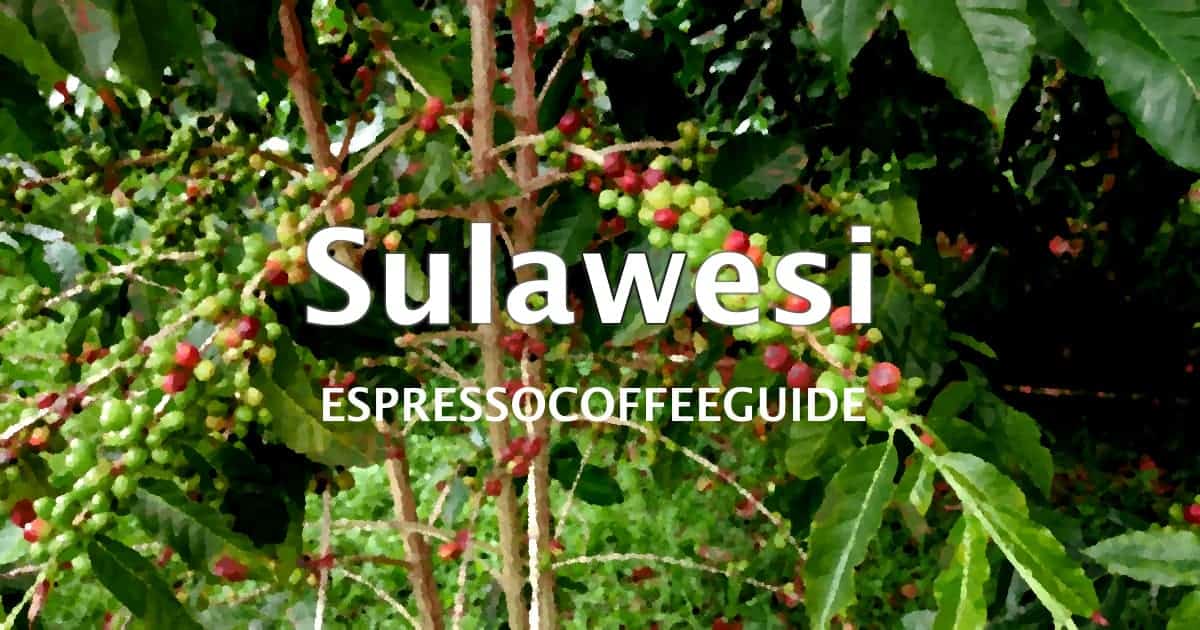
Sulawesi coffee is best known for its silky body, moderate acidity, and smooth finish. Its flavors tend to land on the warmer side of spice, with bold cinnamon, cardamom and at times black pepper.
- Region: Toraja, Sulawesi
- Growing Altitude: 1,400 - 1,900 meters
- Variety: Bourban, Pacas, Pacamara
- Harvest Period: July - September
- Milling Process: Washed, Sun Dried
- Aroma: Chocolate, Almond
- Flavour: Spicy, Sweet, Smokey
- Body: Rich, Full
- Acidity: Low
The most distinguished Sulawesi coffee is Toraja (also called Celebes coffee), along with Kalossi, a multi-dimensional coffee grown in the southeastern highlands and distinguished by its expansive flavor with a full-bodied richness.
A good Toraja is well-balanced with undertones of ripe fruit and dark chocolate. High elevations (1,400-1,900 meters+) in the region qualify much of these coffees for Strictly High Grown status.
Jump to:
Reviews: Tasting Notes
Toraja coffee tends to have a relatively low-toned yet vibrant acidity, though usually slightly more acidic and with less body than Sumatran coffees and more earthy than Java Arabica.
Like Sumatran coffees, the cup profile of Toraja has been called deep and brooding, with muted fruit notes and rustic sweetness and often a pungent spicy quality.
A Dark Roast is recommended to amplify the best Sulawesi coffee flavors. Typically a highly rated coffee, Sulawesi isn't incorporated into many blends, however home roasters may wish to explore adding it to blends for its unique flavors.
Starbucks
Sulawesi has been featured by the Starbucks Reserve program a number of times, most interestingly the "Whiskey Barrel-Aged Sulawesi". The idea was that the green beans would absorb flavor from the whiskey barrels, imparting a whiskey flavor, and those who had the chance to try this extremely-limited product noted that it worked.
Farming Regions
Sulawesi Toraja coffee is grown at relatively high altitudes on the island of Sulawesi, formerly called Celebes (the Dutch colonial name), located in the middle of the Indonesia's Malay archipelago. Toraja coffee is also referred to as Celebes.
The coffee growing area of Kalossi is located in the country's southeastern highlands. The coffee growing regions have expanded and coffee is now also grown in Mamasa, Enrekang, Gowa & Sinjal and Utara, though you won't typically see these on the market.
Green Coffee Processing
Processing of Toraja coffee is done by the Giling Basah wet-hull method, which produces chaff-free green coffee beans (milled but not yet roasted) with a distinct dark tint. The semi-dry processing, which sometimes leads to uneven roasting, has a significant effect on the character of the brewed coffee.
In some cases the coffee processing creates a hard or musty taste, and sometimes a strong earthiness which is admired by some people though others find it quite unpleasant.
The best Toraja coffees come from the area small farms north of Toraja at higher altitudes. This higher elevation coffee is generally regarded as a finer coffee than the coffee grown in more southern areas at lower elevations.
Buying Wholesale / Bulk Coffee
Sulawesi is one of the rare coffees, much less common compared to the neighbouring Sumatra or Bali. When introducing more exotic coffees into your lineup, we recommend ordering smaller quantities of fresh roasted from distributors, more frequently than large orders spaced sparsely. This prevents coffee sitting on shelves for too long, leading to a loss of flavor and quality.
Quantities up to 50-lb boxes can easily be shipped via common carrier, and are more efficient than shipping smaller quantities - the shipping cost as a percentage of total product cost decreases as more is added.
Hitting the full bag (132-lb/150-lb) point from green coffee importers and brokers means that a pallet (skid) is often required however, which results in a significant increase in cost. Similar to above, you want to order multiple bags of unroasted green coffee beans and stack them on a skid, which will bring down the shipping-cost-per-unit.
With these quantities, wholesalers typically require advance notice (1-2 months) to smooth out the production schedule and inventory levels.
Organic Sulawesi is not yet available on the market.
Coffee Brewing Tips
Beware of buying Sulawesi coffee from brands off Amazon, which are usually roasted weeks or months before being sold as they move through the distribution chain and warehouses. You will find that Sulawesi is easier to find however, than the neighboring Borneo.
For tips on brewing the best cup of Sulawesi coffee see our section on coffee brewing. Also see our thorough coverage of the taste profiles of Specialty Coffees from all around the world, and instructions on preparing Espresso Drink Recipes for just about every espresso drink known!
For easy-to-follow instructions see Pulling A Perfect Espresso Shot as well as How to make a Latte.
History
No one quite knows where coffee first showed up in North Sulawesi or how it got started, but the world is thankful it did. Hundreds of years ago it began growing as an agricultural product in Celebes (now known as Sulawesi) with a strong cultural that cares for quality.
While the coffee has always been organically grown, more organic certified Sulawesi is beginning to show up on the market in recent years. While generally a higher priced coffee, it's exclusivity makes it a must-try and offers bragging rights to coffee snobs.
Buy Sulawesi Coffee Beans
- ✔️ Fresh roasted to order
- ✔️ 100% high qualtiy Arabica coffee
- ✔️ Custom grind (or whole bean)
- ✔️ 1-way valve, laminate bag (for freshness)
- ✔️ Bulk discounts
Green Coffee Production
| Year | 60kg bags | Coffee grown |
| 2016 | 10,000,000 bags | 1,320,000,000 pounds |
| 2015 | 12,317,475 bags | 1,625,906,713 pounds |
| 2014 | 11,418,277 bags | 1,507,212,604 pounds |
| 2013 | 11,265,194 bags | 1,487,005,621 pounds |
| 2012 | 11,518,538 bags | 1,520,447,016 pounds |
Green Coffee Exports
| Year | 60kg bags | Coffee exported |
| 2016 | 0 | 0 pounds |
| 2015 | 7,985,480 | 1,054,083,360 pounds |
| 2014 | 6,679,280 | 881,664,960 pounds |
| 2013 | 9,954,190 | 1,313,953,080 pounds |
| 2012 | 11,257,540 | 1,485,995,280 pounds |
Data may not be available for the most recent year.
Source: ICO
Facts

























produced 1,625,906,713 lbs
exported 1,054,083,360 lbs
That's over 65% exported!
Sounds like a lot? It's actually 8.1% of the coffee grown worldwide.

(that's 4,593 to 6,234 ft)
Source: ICO


Dor
Hello I would like to order a small sample
James van Alstyne
Need quote on wholesale quantity of Sulawesi beens, green.
Jocelyn
Good Day!
We are interested to your coffee, may we request to send as samples for tasting.
Thank you.